2024 Job Application Statistics

A Bad Application Experience Could Deter New Hires
For a long time, businesses interviewed with the expectation that job candidates were there because they wanted the job and would accept an offer no matter how mundane, inane, paint-by-number, or superfluous an interview was.
But things are changing.
A PricewaterhouseCoopers survey found nearly half of U.S. job seekers turned down a job offer because of a less-than-par interview. Reasons given include too long an interview process, not having a good understanding of the day-to-day work culture, lousy communication, bad online workplace reviews, and a lackluster approach to diversity and inclusion (not surprisingly, many individuals cited a positive interview experience, but turned down the role because they couldn’t work a remote or flexible schedule).
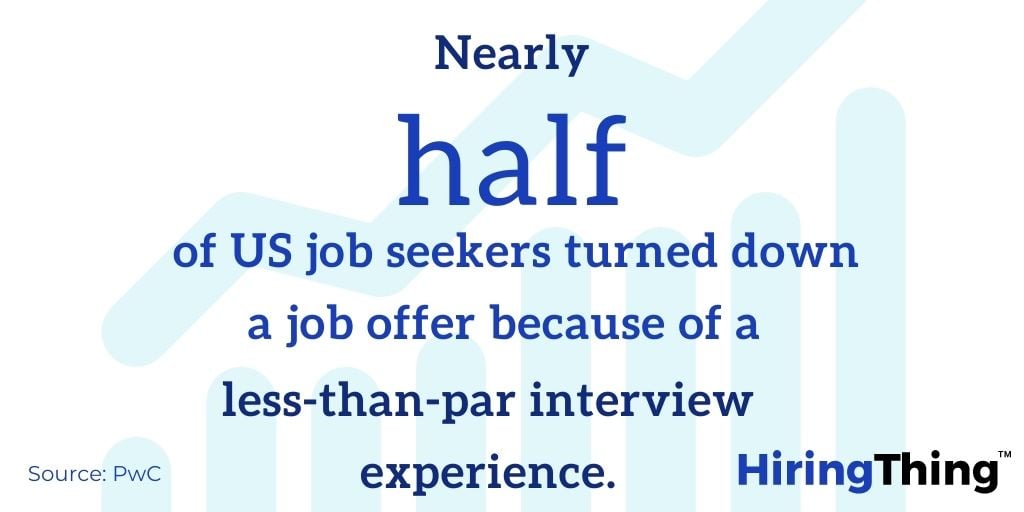
The world of work is changing rapidly, and today’s organizations need to consider candidate experience to find and retain top talent. It’s not a bad time to rethink your organization’s interview process and ensure it aligns with what today’s job seekers want. Below, we’ve included relevant stats about the job application process, candidate experience, employer branding, the interview process, and job offers so that you can make data-driven decisions that will shape your job application experience for 2023’s job seekers.
2023 Job Application Statistics
- Application Process
- Candidate Experience
- Employer Branding
- Interview Process
- Job Offers
- Related Resources
Application Process
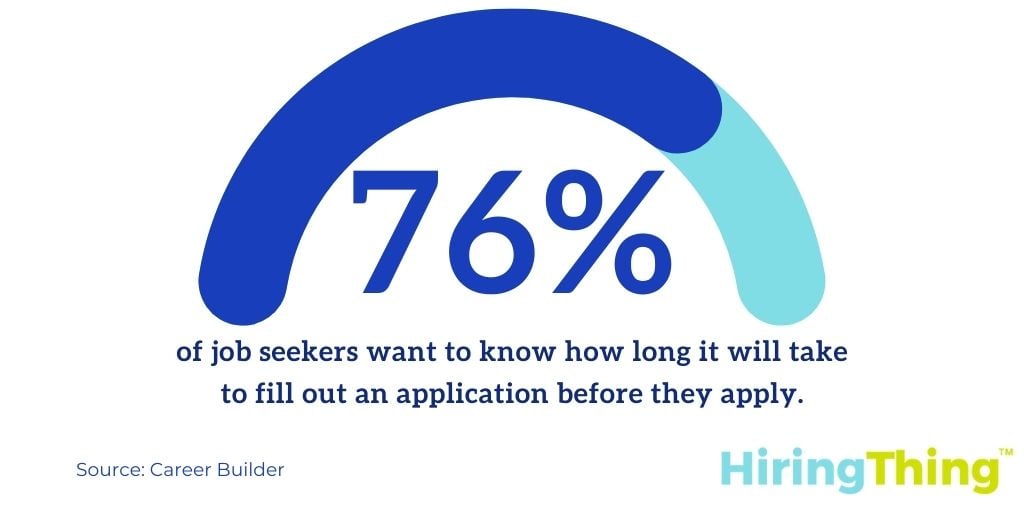
The actual job application can make or break your recruiting strategy. According to Career Builder, 60% of job candidates will stop an application mid-way through because they find the process too long or unwieldy. CareerBuilder found the average job-seeker doesn’t want to complete an application that will take longer than twenty minutes.
- Lack of information about pay and benefits (50%) and interview schedule changes (50%) are the two main reasons job seekers view the job application process as stressful—this should tell savvy employers to avoid both of these scenarios to keep job seekers engaged in your interview process.
- Glassdoor found that, on average, each of their corporate job postings attracts approximately 250 resumes. Only 4-6 will get called to interview, and one will get the job from those who apply.
- Glassdoor also found that 67% of job seekers believe job ads should contain information about salaries, benefits, location, commute time, and employee reviews.
- 76% of job seekers want to know how long it will take to fill out an application before they apply.
- There are some discrepancies between what employers and employees expect. 70% of job applicants feel an online application should be five steps or fewer, while only 40% of employers feel the same. Unsurprisingly, only 40% of employers have gone through their job application process to test it out.
- Jibe Staffing found that 60% of job candidates cannot complete online applications due to tech hurdles and barriers.
.jpg?width=1920&height=1080&name=Josh%20Thought%20Leader%20Quotes%20(11).jpg)
Candidate Experience
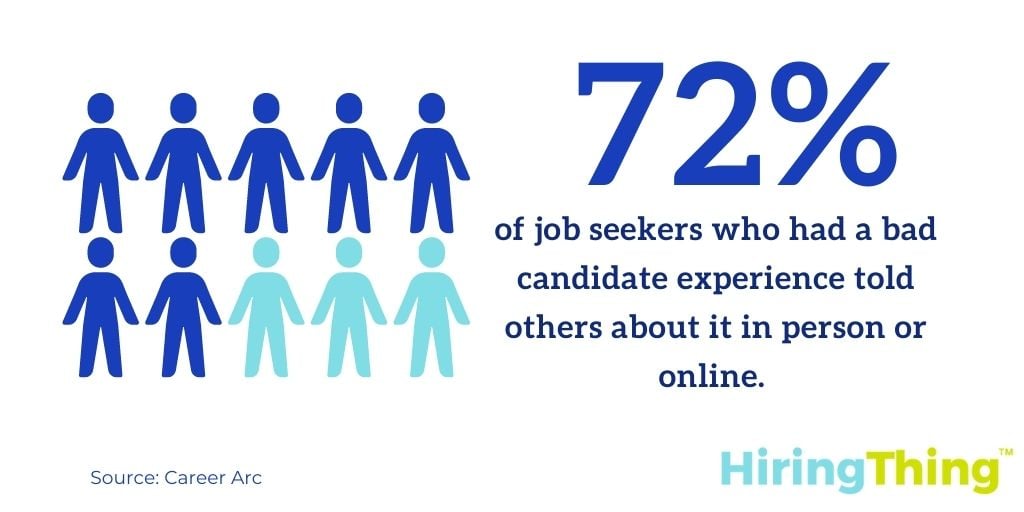
Your job applicants talk—37% of job candidates say they’ve left a negative online review after having a negative experience, and 1 in 3 job candidates have turned down a job offer because of a company’s bad reviews, regardless if they’re true! Better news? 61% of job candidates say they’ve left a positive review after having a positive candidate experience.
- 76% of job seekers say not hearing back after submitting a job application trumps the frustration of not hearing back after a first date.
- 63% of job seekers will reject a job offer due to a bad candidate experience.
- 72% of job seekers who had a bad candidate experience told others about it online or in person.
- 72% of job seekers need to fully understand the work culture before accepting a job offer.
- CareerBuilder found that candidates said it would significantly improve their candidate experience if they provided a transparent, accurate depiction of the hiring process. 76% of employers feel they do a good job setting expectations from the get-go, but only 47% of job seekers agree.
- 66% of job seekers said they would wait only two weeks for a callback, after which they consider the job a lost cause and move on to other opportunities.
- Employers are becoming wise to the importance of the candidate experience. 82% of employers view candidate experience as critical.
- 64% of job seekers say that a bad candidate experience would cause them to stop purchasing goods or services from a company.
.jpg?width=1920&height=1080&name=Josh%20Thought%20Leader%20Quotes%20(10).jpg)
Employer Branding
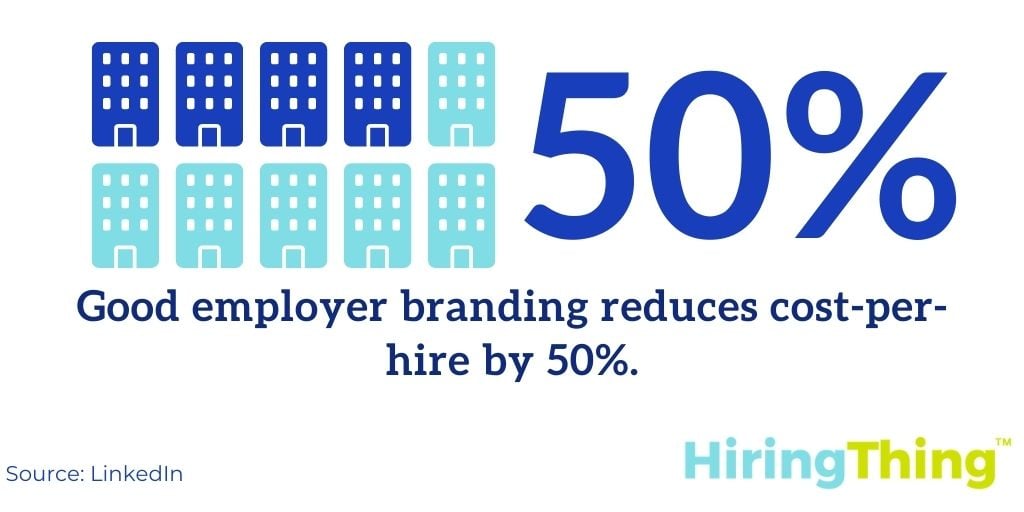
Employer branding is your reputation among employees and job seekers as a place to work. A strong employer brand can reduce turnover by 28%, and 75% of job seekers are likely to apply for a job with a positive reputation.
- 79% of job seekers will consider a company's mission statement before applying.
- Businesses with excellent employer branding receive up to 50% more qualified job applicants.
- 39% of women consider the company's brand as “very important” before deciding to apply, while the same is true for 33% of men—on average, candidates will read six company reviews before forming an opinion on the business.
- LinkedIn surveyed worldwide recruiting leaders and found that 72% agreed that employer brand significantly impacts hiring. 80% agreed that employer branding significantly affects attracting quality talent.
- Surveyed small and medium-sized businesses (SMBs) report company websites (69%), online professional networks (61%), and social media (47%) are their top employer branding efforts.
- Good employer branding reduces cost-per-hire by 50%.
- 86% of HR professionals said that recruiting is becoming more like marketing, and 86% of Glassdoor users read company reviews and ratings before applying for roles.
- 55% of job seekers who talked to Glassdoor said reading a negative review of a company caused them not to apply. At the same time, CareerArc found 36% of employees say a company’s reputation as a place to work was “very important” when accepting a new role.
.jpg?width=1920&height=1080&name=Josh%20Thought%20Leader%20Quotes%20(8).jpg)
Interview Process
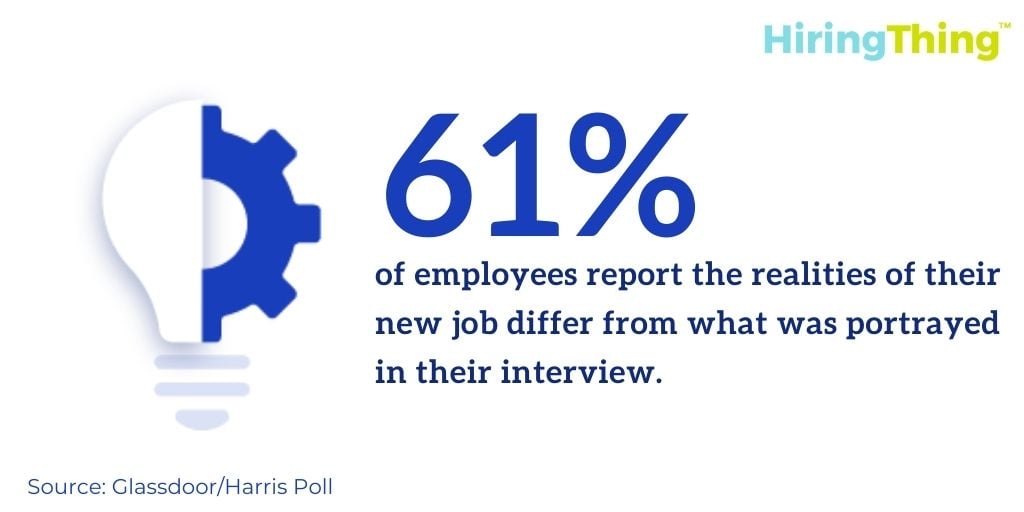
67% of employed Americans say job interviews influence their decision to accept jobs. Interviewing matters!
- A Glassdoor/Harris Poll found 61% of employees reported the realities of their new job differed from what their interview portrayed.
- An MRI Network Recruiter Sentiment Study found 35% of organizations’ interview processes lasted 5-6 weeks, 23% lasted 7-8 weeks, 31% lasted 3-4 weeks, 8% lasted 1-2 weeks, and 3% lasted more than nine weeks.
- On average, a job candidate will get one interview request for every six applications they complete—the average job-seeker applies to twenty-seven companies before landing an interview.
- 81% of recruiters have claimed that virtual recruitment will continue well after the COVID-19 pandemic and 74% of recruiters say video interviews make their lives easier.
- Initial phone screenings typically last fifteen minutes, while the average face-to-face interview (whether that’s in-person or via video chat) lasts forty minutes to an hour.
.jpg?width=1920&height=1080&name=Josh%20Thought%20Leader%20Quotes%20(7).jpg)
New to video interviews? We’ve been conducting them since our inception in 2012! Here are some tips for a great candidate asynchronous video experience.
Back to TopJob Offers
.jpg?width=1024&name=Copy%20of%20More%20Blog%20Stats%20(3).jpg)
17.3% of U.S. job offers—more than 1 in 6—are rejected. Glassdoor tracks this data and reports there’s been a steady increase in offer rejections over the last few years. This should be eye-opening to employers—assume all your candidates are fielding multiple offers.
- Candidates are 1.4-2.5% more likely to accept an offer if their interview includes a skills test and 1-2.3% less likely to accept an offer if the application process consists of an IQ or personality test.
- Job candidates like to feel challenged during the interview process (not unnecessarily, however). Candidates are 2.6% more likely to accept a job offer if they find the interview process suitably difficult.
- The MRI Network Recruiter Sentiment Study found that candidates told employers they were rejecting the offer due to accepting another offer (32%), compensation (25%), taking a counteroffer (15%), or too lengthy a hiring process (11%).
- Candidates told the same study that they actually declined offers because of compensation (27%), accepting another offer (12%), and limited professional development (6%).
- 35% of job seekers told CareerBuilder they’ll turn down an offer if the employer does not offer a remote work option.
- LinkedIn users say the most important consideration when accepting new job offers are compensation (49%), professional development (33%) and a better work/life balance (29%).
.jpg?width=1920&height=1080&name=Josh%20Thought%20Leader%20Quotes%20(6).jpg)
Use these stats, along with the HiringThing Guide to Increasing Your Applicant Traffic to reimagine your recruiting in a data-driven way today!
An Applicant Tracking System Can Strengthen Your Application Experience
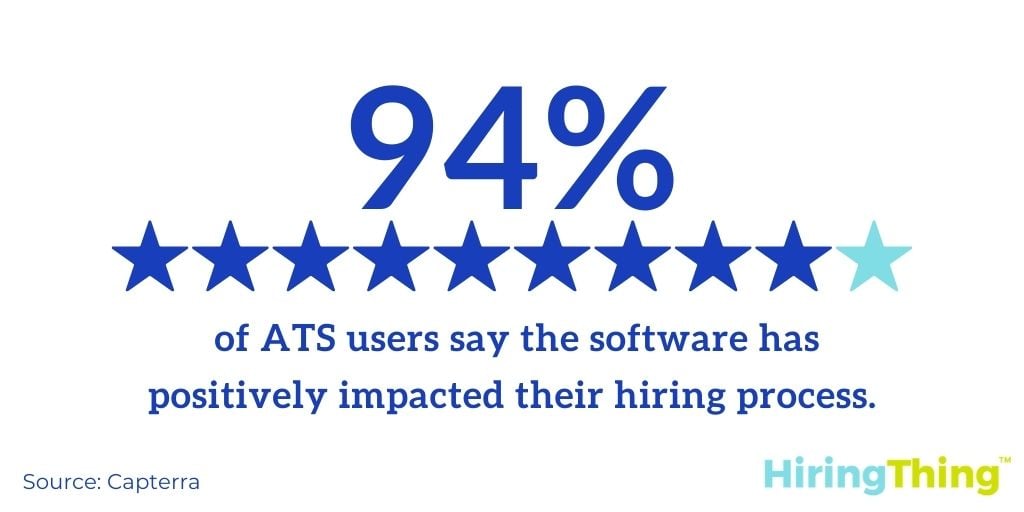
An applicant tracking system (ATS) is designed to help organizations organize, automate, and streamline their recruiting. Organizations utilizing an ATS report quicker hires, better hires, and an improved hiring experience. 94% of hiring professionals say that using recruitment software has positively impacted their hiring process.
Related Resources
- Recruiting Stats to Help Plan Your Year
- Remote Work Statistics Prove It's the Future of Work
- The HiringThing Guide to DEI Recruiting
- Innovative Strategies to Improve Recruiting and Retention
About HiringThing
HiringThing is a modern recruiting and employee onboarding platform as a service that creates seamless talent experiences. Our white label solutions and open API enable HR technology and service providers to offer hiring and onboarding to their clients. Approachable and adaptable, the HiringThing HR platform empowers anyone, anywhere to build their dream team.



